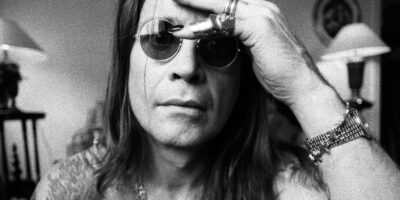Gustav Åhr, more popularly known as Lil Peep, was born on November 1, 1996 and died on November 15, 2017. He had just turned 21. I kept reading his birthdate when I heard the news. Lil Peep was born a year before me, and now he’s gone. He had already made quite a name for himself too, helming the vanguard of the emo-rap genre, a musical brew that should’ve never had a chance of working. There was already the horrible abomination known as nu-metal that scourged the late ‘90s and early 2000s, and it was easy to believe we didn’t need another mixing of two genres that really could not be farther from each other. Yet Lil Peep proved that there may be some middle ground to be reached. His ambition didn’t differ much from the usual rap star’s, though: “I’ve had my heart broken in a lot of different ways a lot of different times by different people—whether it be a family member, a girlfriend, a friend, just all types of relying on people, making yourself vulnerable to people. And then they fuck you over. You just want to succeed and rub it in their face. That’s the theme.” He was out to prove his worth and then flaunt it—it was about getting rich or dying trying. Peep was aware of where he stood amidst the new school of hip hop and had made quite the foothold with his newfangled engineering of “sadboy” rap.
There were obviously skeptics and haters. Who the fuck does this white boy, My-Chemical-Romance-listening high school dropout from Long Island think he is? Turns out he was wondering the same thing—as he said in an interview with Pitchfork, “I have no idea. But I know it’s going to happen and it’s going to be really fun to see where I end up and who ends up fucking with me.” He couldn’t exactly articulate what he had to offer, but his laid-back confidence suggested he knew it was good. Despondency was in fashion, and it seemed his contemporaries took note, and not just those that were a part of his emo-trapper crew, GOTHBOICLIQUE. XXXTentacion prefaced his debut album with “I put my all into this in hopes that it will help cure, or at least numb your depression.” Lil Uzi Vert wallowed in the cafard too, with his requiem for a rapper “XO Tour Lif3” becoming his biggest and, by all accounts, his best, song to date. Peep was onto something, and his peers (some bigger than him) were just catching up.
It’s not as if rappers hadn’t opened up before, hadn’t mused about depression or mental illness—Future frequently let his heart eke out from behind all that ice and guarded machismo, but it was just that: there was a reluctance, and there was a holding back from letting your feelings take centerstage over typical rap trappings. Peep’s origin perhaps most mirrors that of Drake’s: a kid unafraid to lament his female troubles while still being able to find respect in the rap game. Vulnerability couldn’t make up the entirety of the shtick though, and Drake knew this. There had to be something to compensate for the it. For every “Best I Ever Had,” there had to be an “I’m Goin’ In.” But for Lil Peep, feelings were at the forefront from the start. He unabashedly sampled some of music’s most melancholic participants, including Brand New and The Microphones. His first EP was titled FEELZ. “Crybaby” was tatted on his forehead, for Christ’s sake. Out of the gate, Lil Peep presented himself as nothing other than an emotional teenager.
And his coping mechanism, as it is for most teenagers, was drugs. His poison of choice, made more than evident in lyrics and social media posts, was Xanax. He was aware of his pain too, but denied help. When asked about possibly medicating his depression in the Pitchfork profile, he answered, “Everyone always begged me to, but I don’t want to do it. I just like smoking weed and whatever other drug comes my way.” He may come off blasé on the surface, but you could hear this battle in his music. There was clearly a desire to quell his inner demons.
One of his best songs, and best examples of this clashing of vices and welfare, is “OMFG” from his 2016 mixtape HELLBOY. The rustling, dusty guitars of The Microphones’ “I’ll Not Contain You” set the stage for a certain tearjerker. Then skittering hi-hats fade in for good measure. The simplicity in the lyrics gives it all the weight, though Lil Peep doesn’t have time to mask them in metaphors and clever wordplay—more so, he isn’t able to when they’re pouring out uncontrollably. “I used to wanna kill myself / Came up, still wanna kill myself / My life is goin’ nowhere / I want everyone to know that I don’t care,” he delivers in an apathetic stupor. Next, rippling bass and trap drums bombard Peep as he breaks into full-fledged, neck-veins-poppin’ vocals straining for love, for help, for cocaine, or for all three: “Baby girl, you got nothin’ on her / you’re the only one that could ever compare / I can’t hear what you’re tryna say / Cocaine love it goes straight to your brain / Why the fuck is everybody the same?” That last bar could probably headline the FAQ page on everyangstyadolescent.com. “OMFG” is masterful chemistry of Peep’s sound.
Like others that went too soon, he portended his own demise and the hints are littered throughout all of his material. His whole catalog is wrought with death cries and whispers. The music video for “White Wine” cuts back and forth between Peep and Amy Winehouse as he grieves, “Every night, then I wake up and I’m still fuckin’ high / Lord why, Lord why do I gotta wake up?” Some LIFE AFTER DEATH-level intimations. Earlier this year, he released a collab, EP CASTLES II, with longtime friend and GOTHBOICLIQUE affiliate Lil Tracy, where he was at his most vampiric, but rather than blood serving as his nourishment, it’s “switchblades [and] cocaine.” Peep touts the inauspicious pair as a staple of his lifestyle at the EP’s focal point, “Witchblades.” COME OVER WHEN YOU’RE SOBER, PT. 1, his latest and last project, while the most concentrated thus far, showed that his ability to stay afloat was patently waning. The drugs and depression were deluging and he knew it on “Better Off Dying” (“Baby, I’ma dive in, I don’t put the time in / Even if I try hard, I ain’t gonna make it”). He couldn’t stop.
https://soundcloud.com/gothboiclique/lil-peep-lil-tracy-witchblades-prod-bighead-yungcortex
With all this talk of lethal cocktails so entrenched in his discography, maybe Peep really was a vampire, able to survive all the self-destruction; There’s almost this air of invincibility, or rather, one of the undead, as if he was this Sisyphus-type being, consumed by despair, pushing his rock of narcotics up the hill ad infinitum, hoping it’ll all end at some point. Commenting on the performative aspect of hip hop, Peep stated, “It’s like professional wrestling—everyone has to be a character.” And so, there was hope that all this drug and death talk was just him playing up the persona. Gustav Åhr was tortured and racked with sadness. He explains in an interview that Lil Peep was, in a sense, his alter ego created to manage such emotions.
“Some days I’ll be very down and out, but you won’t be able to tell, really, because I don’t express that side of myself on social media. That’s the side of myself that I express through music. That’s my channel for letting all that shit out.”
Reminiscent of another star whose work supposedly contributed to his untimely passing, Heath Ledger, the gap between life and art was dramatically closing for Åhr. Thankfully, he left behind an ample amount of music to enjoy, and while not dying would’ve been wholeheartedly preferred, it adds an entire other layer to the artistry. Eerie soothsaying looms over every track. On “drive,” another song from HELLBOY, Peep rambles in a languid slur about the consequences of his reckless antics: “I’mma die, I ain’t even 25.” It’s a damn shame he turned out to be right.
















Comments